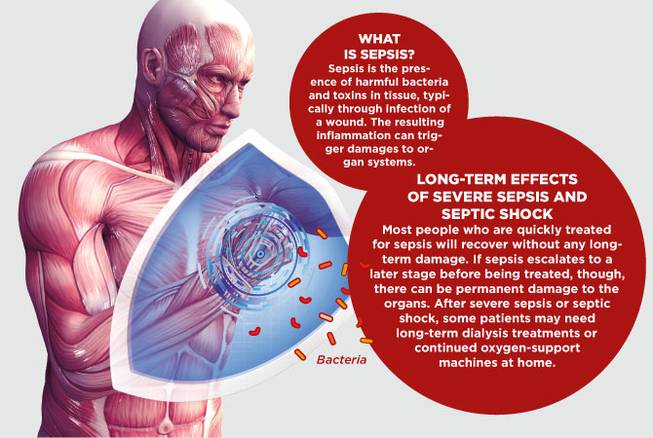
Monday, Jan. 9, 2017 | 2:01 a.m.
Sepsis is becoming an increasingly common condition in the United States that stems from complications following an infection. Sepsis occurs when the body has an inflammatory response to the chemicals released into the bloodstream meant to fight the initial infection.
“This condition can be life-threatening and can lead to tissue damage, organ damage and death if left untreated,” said Marlena Gonzales, BSN, RN, Sepsis Program Coordinator at MountainView Hospital.
What is sepsis?
Sepsis is the presence of harmful bacteria and toxins in tissue, typically through infection of a wound. The resulting inflammation can trigger damages to organ systems.
Symptoms of sepsis
• Confusion or disorientation
• Loss of appetite
• Pain or discomfort
• Clammy skin
• Respiratory rate higher than 20 breaths a minute
• Heart rate higher than 90 beats a minute
• Somnolence (extreme drowsiness or fatigue)
• Fever above 101 degrees
• Shortness of breath and/or difficulty breathing
• Low blood pressure
• Low urine output
Diagnosing sepsis begins with a confirmed infection, as well as having some of the symptoms above. It occurs in three stages: sepsis, severe sepsis and septic shock. The sooner sepsis is discovered and treated, the higher the chances for a favorable outcome.
Who gets sepsis?
“Anyone with an infection can be vulnerable to developing sepsis,” Gonzales said. Most commonly, sepsis occurs in people 65 years or older, or infants less than 1 year old. People who have weakened immune systems, such as patients who have cancer and are being treated with chemotherapy and/or radiation, are more susceptible. In addition, patients who have frequently used steroids or antibiotics, recently had surgery or have a chronic medical condition (such as HIV/AIDS or diabetes) are more prone to developing sepsis.
While any infection can lead to sepsis, the most common types associated with the condition are pneumonia, urinary tract infections, skin infections, kidney infections, bloodstream infections and abdominal infections. Further, as infections caused by antibiotic-resistant bacteria continue to rise, so may the instances of sepsis.
Diagnosis and treatment
“There are recommended diagnosis and treatment guidelines for sepsis, but it can sometimes be difficult to recognize the condition,” Gonzales said. The hospital staff will perform an assessment, diagnostic test and lab work to determine if the patient has sepsis.
When sepsis is caught in an early stage, it can be treated similarly as the infection itself.
“Hospitals treat people with IV antibiotics, IV fluids, oxygen and blood work/testing to find the source of the infection,” Gonzales said. However, if sepsis is caught in a later stage, there can be damage done to the surrounding tissue and/or organ that can require surgery to remove.
Prevention and recognition
Preventing sepsis is possible if you’re able to prevent infection from occurring in the first place. “Proper hand-washing is the key to stopping the spread of infection,” Gonzales said. She also noted that staying well hydrated, getting a yearly flu vaccine and potentially getting a pneumonia vaccine, if you meet the criteria, can help.
It’s important than anyone who has been prescribed antibiotics for any reason is diligent about taking the full round of medication. Doing so can help prevent antibiotic resistance within the body. Furthermore, if you’re not seeing improvement within the first couple of days of being on antibiotics, or your condition is worsening, notify your doctor immediately.
If you’re recovering from surgery, wound treatment or a burn, be sure to keep your wound area clean following the guidelines from your doctor. If you see redness, swelling or drainage from a wound, contact your doctor immediately, as these can be signs of a developing infection.
While recovering from an infection, be aware of the symptoms and warning signs of sepsis. If you think you’re experiencing signs of sepsis, call your doctor or go to the emergency room immediately to avoid further escalation. “Tell your doctor or nurse that you’re concerned about sepsis when you seek medical treatment. Sepsis is a medical emergency, so communicating and being timely about treatment is necessary,” Gonzales said.
Long-term effects of severe sepsis and septic shock
Most people who are quickly treated for sepsis will recover without any long-term damage. If sepsis escalates to a later stage before being treated, though, there can be permanent damage to the organs.
After severe sepsis or septic shock, some patients may need long-term dialysis treatments or continued oxygen-support machines at home.

Join the Discussion:
Check this out for a full explanation of our conversion to the LiveFyre commenting system and instructions on how to sign up for an account.
Full comments policy